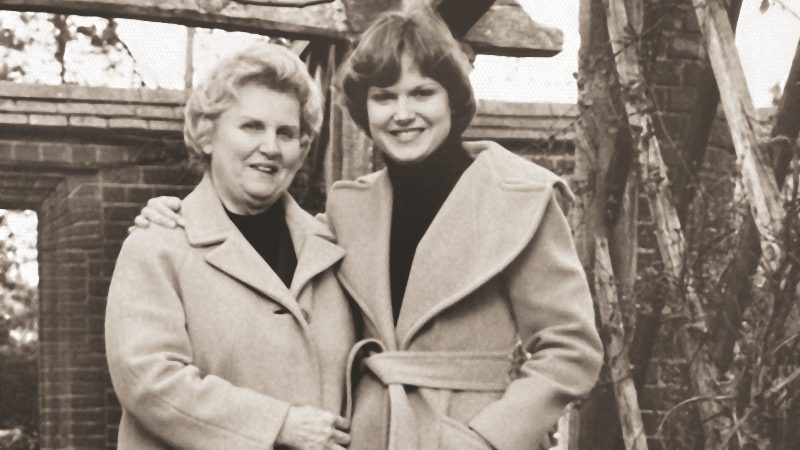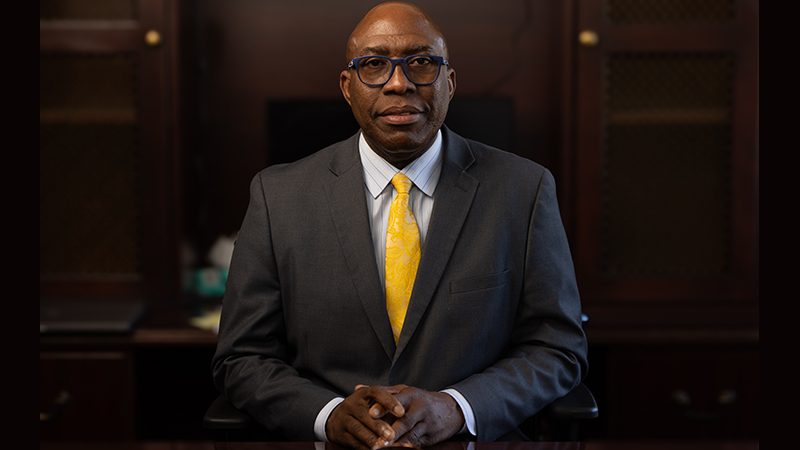The recently opened center works to carry forward the ideals of a master teacher, embodied by the legacy of its namesake.

When we think of a master teacher, one whose legacy we hold up to emulate, we think of one whose impact goes beyond the four walls of the classroom. We do not think only of a vibrant scholar with a vast depth and breadth of expertise but also of one who takes a personal interest in students and remains a source of support and mentorship beyond graduation.
Walter Utt was that kind of master teacher.
Utt was an extraordinary history professor at Pacific Union College who left an indelible mark on the lives of many. An intellectual, yes, but his wit and humor engaged his students. Students clamored to be in his classes because his lectures were different. He rarely regaled them with personal stories of his own life. He kept them hooked with riveting narratives about historical figures and causes.
He didn’t stand at his lectern tied to a neatly typed outline. Instead, Utt engaged with the class, referring only to a few errant cards or scraps of paper with quotations and probing discussion questions. He never drove at a specific answer but was genuinely interested in the ideas and opinions of his students.
“He enjoyed laying out a range of possible interpretations and asking students to join the debate,” writes former PUC President Eric Anderson in a forthcoming biography of Utt. “His students needed to create their personal syntheses, he believed, not simply to learn and repeat someone else’s interpretations.”
In a memoir of Utt written for Spectrum Magazine in 1986, retired psychiatrist Bruce Anderson recalled, as a history major, being “entertained and overawed” by the professor and his engaging yet unconventional lecture style.
Yet, Utt disdained the idea of being lionized as a professor. “I don’t want to be singled out as some saintly Mr. Chips or anything of that sort,” he once told Bruce Anderson.
But Utt does deserve recognition, Bruce Anderson said, as the kind of high-caliber, dedicated Christian teacher our Seventh-day Adventist institutions should always be working to cultivate and nurture.
Now, the new Walter C. Utt Center, officially opened this summer, embodies the hallmarks of its namesake. But as opposed to a monument or tribute to one man, the center has a larger goal and an extensive reach into the future. It’s meant to carry on the spirit of a unique kind of education that combines teaching critical thinking and a love of history—whether it be of the college, the Seventh-day Adventist church, or the world—to students for years to come.
Karl Wilcox, director of the Utt Center and the Utt Professor of History, said he hopes the facility will preserve and carry forward the late professor’s legacy. “The Utt Center should be a place where students come to think, hear and tell stories, examine evidence, seek truth, interpret the past, and evaluate truth claims,” he said.
Like many Seventh-day Adventist teachers, he saw the chance to have an impact on thoughtful young people.
The top floor of the Utt Center features the Percy and John Christian Conference Room and seminar room. The PUC Board of Trustees will commence holding its meetings in the conference room this fall. Milbert Mariano, PUC dean of humanities, arts, and professions, who also serves as director of the honors program, will hold discussion-based courses in the seminar room this year.
In October, Wilcox said, a workshop on the Old Testament narrative, sponsored by the North American Division of Seventh-day Adventists, will be held in the Utt Center. Additionally, Wilcox has plans to revive the Rine Lectures. Named after PUC’s first English professor, George Washington Rine, the series was initially established in 1939.
On the lower floor of the Utt Center is a library, archive, and scholars’ study area, along with offices for the director and others. Found here are a wide variety of historical materials, including documents, photographs, and a host of other collections.
Wilcox also plans to teach his upcoming Shakespeare course in the scholars’ study area.
The creation and construction of the Utt Center were made possible by the generous contributions of a group of donors, many of whom were personally touched by Utt during his time as a professor at PUC and beyond. Indeed, Bruce Anderson—along with others in the group who received them—counts 72 letters from Utt as one of his most prized possessions.
Following Utt’s untimely death in 1985, the group was determined to keep his memory alive and raised several million dollars to help do so—including through the creation of an endowment. Led by Bruce Anderson, they sponsored regular visiting professors and also found co-authors to complete several books. The endowment provided essential funding toward the building of the Utt Center, along with contributions from PUC and other donors, including the Christian family.
“What kept Walter Utt going was his students,” Bruce Anderson wrote in Spectrum. “Like many Seventh-day Adventist teachers, he saw the chance to have an impact on thoughtful young people.”
Although the Utt Center is a brand new building, it is dedicated to preserving and understanding the past, Wilcox said.
“In the post-modern world we live in, much of our collective past has been suppressed, distorted, discarded, or just plain ignored. We do not live well if we live exclusively in the present— the past is not only revelatory in terms of what is best (and worst) in human experience, it is also vastly interesting, complex and, thus, valuable,” Wilcox said. “History is story, and PUC students need stories as well as credits and qualifications. As I often tell my students, to be human is to love stories, and the Utt Center Archive is chock-full of stories waiting to be discovered by students and established scholars alike.”


Wilcox sees the Utt Center as “a place that models vital and lively teaching and where Socratic dialogue prevails over didactic content.”
He wants the center to help promote “an intelligent and lively interest” in the humanities, something he said is of vital necessity.
“The Utt Center holds as virtuous the pursuit of truth and wisdom through history, and as a scholarly enterprise, it exists to practice that particular virtue no matter what the surrounding culture might demand or think to prefer in its place,” Wilcox said. “The Utt Center has a radical agenda—to relieve students of the terrible burden of not knowing and thus not caring about their own past.”
____________________
By Laura Gang
El Walter C. Utt Center: Un lugar para pensar, examinar la evidencia y buscar la verdad
El centro recientemente inaugurado procura llevar adelante los ideales de un destacado maestro, encarnado en el legado de su homónimo.

Cuando pensamos en un maestro de maestros, uno cuyo legado sostenemos para emular, pensamos en uno cuyo impacto va más allá de las cuatro paredes del aula. No solo pensamos en un académico vibrante con una vasta profundidad y amplitud de experiencia, sino también en uno que se interesa personalmente en los estudiantes y sigue siendo una fuente de apoyo y tutoría más allá de la graduación.
Walter Utt fue ese tipo de maestro.
Utt fue un extraordinario profesor de historia en Pacific Union College que dejó una huella indeleble en la vida de muchos. Un intelectual, sí, pero su ingenio y humor capturó a sus alumnos. Los estudiantes clamaban por estar en sus clases porque sus clases eran diferentes. Rara vez les contaba historias personales de su vida. Los mantuvo cautivados con narrativas fascinantes sobre figuras y causas históricas.
No estaba de pie frente a su atril atado a un contorno cuidadosamente mecanografiado. En cambio, Utt se involucró con su clase, refiriéndose solo a unas pocas tarjetas errantes o trozos de papel con citas y preguntas de discusión de sondeo. Nunca llegó a una respuesta específica, sino que estaba genuinamente interesado en las ideas y opiniones de sus estudiantes.
«Le gustaba exponer una variedad de interpretaciones posibles y pedir a los estudiantes que se unieran al debate», escribe el ex presidente de PUC, Eric Anderson, en una biografía de Utt que se publicará próximamente. «Creía que sus alumnos necesitaban crear sus síntesis personales, no simplemente aprender y repetir las interpretaciones de otra persona».
En unas memorias de Utt escritas para Revista Spectrum en 1986, el psiquiatra retirado Bruce Anderson recordó, como estudiante de historia, haber sido «entretenido y asombrado» por el profesor y su estilo de enseñanza atractiva pero poco convencional.
Sin embargo, Utt desdeñaba la idea de ser ensalzado como profesor. «No quiero que me señalen como un santo Mr. Chips ni nada por el estilo», le dijo una vez a Bruce Anderson.
Pero Utt merece reconocimiento, dijo Bruce Anderson, como el tipo de maestro cristiano dedicado y de alto calibre que nuestras instituciones adventistas del séptimo día siempre deben estar procurando cultivar y nutrir.
Ahora, el nuevo Centro Walter C. Utt, inaugurado oficialmente el verano pasado, encarna las señas de identidad de su homónimo. Pero a diferencia de un monumento o tributo a un hombre, el centro tiene un objetivo más amplio y un amplio alcance hacia el futuro. Su propósito es continuar con el espíritu de un tipo único de educación que combina la enseñanza del pensamiento crítico y el amor por la historia, ya sea de la universidad, de la Iglesia Adventista del Séptimo Día o del mundo, a los estudiantes en los años venideros.
Karl Wilcox, director del Centro Utt y profesor de historia, dijo que espera que la instalación preserve y lleve adelante el legado del difunto profesor. «El Centro Utt debe ser un lugar donde los estudiantes piensen, escuchen y cuenten historias, examinen la evidencia, busquen la verdad, interpreten el pasado y evalúen las afirmaciones de la verdad», dijo.
El último piso del Centro Utt cuenta con la sala de conferencias Percy y John Christian y la sala de seminarios. La Junta Directiva de PUC comenzó a celebrar sus reuniones en la sala de conferencias el otoño pasado. Milbert Mariano, decano de humanidades, artes y profesiones de PUC, quien también se desempeña como director del programa de honores, llevará a cabo cursos basados en discusiones en la sala de seminarios este año.
En octubre, dijo Wilcox, se llevó a cabo un taller sobre la narrativa del Antiguo Testamento, patrocinado por la División Norteamericana en el Centro Utt. Además, Wilcox tiene planes de revivir las Rine Lectures. Nombrada en honor al primer profesor de inglés de PUC, George Washington Rine, la serie se estableció inicialmente en 1939.
En el piso inferior del Centro Utt hay una biblioteca, un archivo y un área de estudio para académicos, junto con oficinas para el director y otros. Aquí se encuentra una amplia variedad de materiales históricos, incluyendo documentos, fotografías y una gran cantidad de otras colecciones.
Wilcox también planea enseñar su próximo curso de Shakespeare en el área de estudio de los eruditos.
La creación y construcción del Centro Utt fue posible gracias a las generosas contribuciones de un grupo de donantes, muchos de los cuales fueron tocados personalmente por Utt durante su tiempo como profesor en PUC. De hecho, Bruce Anderson, junto con otros miembros del grupo que las recibieron, cuenta con 72 cartas de Utt como una de sus posesiones más preciadas.
Tras la prematura muerte de Utt en 1985, el grupo estaba decidido a mantener viva su memoria y recaudó varios millones de dólares para ayudar a hacerlo, incluso a través de la creación de una dotación. Liderados por Bruce Anderson, patrocinaron a profesores visitantes regulares y también encontraron coautores para completar varios libros. La dotación proporcionó fondos esenciales para la construcción del Centro Utt, junto con contribuciones de PUC y otros donantes, incluyendo la familia Christian.
«Lo que mantuvo a Walter Utt en marcha fueron sus estudiantes», escribió Bruce Anderson en Spectrum. «Al igual que muchos maestros adventistas del séptimo día, vio la oportunidad de tener un impacto en los jóvenes reflexivos».
Aunque el Centro Utt es un edificio completamente nuevo, está dedicado a preservar y comprender el pasado. «En el mundo posmoderno en el que vivimos, gran parte de nuestro pasado colectivo ha sido suprimido, distorsionado, descartado o simplemente ignorado. No vivimos bien si vivimos exclusivamente en el presente: el pasado no solo es revelador en términos de lo que es mejor (y peor) en la experiencia humana, sino que también es muy interesante, complejo y, por lo tanto, valioso», dijo Wilcox. «La historia es historia, y los estudiantes de PUC necesitan historias, así como créditos y calificaciones. Como a menudo les digo a mis estudiantes, ser humano es amar las historias, y el Archivo del Centro Utt está repleto de historias que esperan ser descubiertas tanto por estudiantes como por académicos».


Wilcox ve el Centro Utt como «un lugar que modela la enseñanza vital y viva y donde el diálogo socrático prevalece sobre el contenido didáctico».
Quiere que el centro ayude a promover «un interés inteligente y vivaz» en las humanidades, algo que, según él, es de vital necesidad.
«El Centro Utt considera virtuosa la búsqueda de la verdad y la sabiduría a través de la historia, y como empresa académica, existe para practicar esa virtud en particular sin importar lo que la cultura circundante pueda exigir o pensar preferir en su lugar», dijo Wilcox. «El Centro Utt tiene una agenda radical: mitigar de los estudiantes la terrible carga de no saber y, por lo tanto, no preocuparse por su propio pasado».
____________________
By Laura Gang






